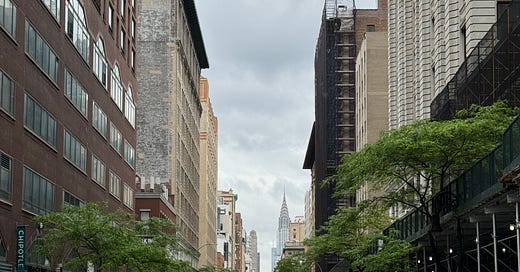Last week’s post for paid subscribers was titled “Big Feelings” and was a prelude to our first trip back to New York since moving to Mexico last September. We’ve now been in the city for all of this week, returning to Mexico tomorrow, providing me with a reasonable amount of time to reflect on what it’s been like to be away for so long, and then to come back to what’s familiar.
I think part of the appeal of this newsletter is that it speaks to the expat experience, and my hope is that someone who might picture themselves living in another country will find something meaningful, or at least interesting, in our experiences. If that’s the case (or if it’s not, and I’ve missed the mark!) please let me know.
While next week will mark a return to stories about Mexico itself, today’s newsletter is more of an essay about returning home after a long absence, and how being an expat influences that experience.
The Transactional Nature of Immigration
I believe the expat experience—the immigrant experience—is inherently one which is transactional, where you both gain and lose things by leaving your country of origin.
I think it’s important to note I’m framing this in the context of voluntary immigration, when a person chooses to go somewhere instead of being forced to for reasons of safety, health, or survival. When someone must leave they can’t be picky about where they end up, and a person could be forced to move from somewhere bad to a place that’s even worse. But for those who have emigrated voluntarily, and with options, I think becoming an expat involves giving some things up and receiving others in return.
New York offers not just an endless buffet of delights but also an equal (if not greater) proportion of difficulty and squalor. But loving New York, to some degree, means embracing its imperfectness. New York is infinitely fascinating, every block a mix of texture, color, aroma, beauty, and disease. If you’re someone who thrives on variety, and isn’t easily disgusted, it’s endlessly satisfying.
It’s easy to be suckered by nostalgia, though, and in Big Feelings I wrote that my wife Andrea said we’d have, as the title indicates, big feelings upon coming back to New York. I’m particularly vulnerable to nostalgia and as anticipated it’s been hard not to focus on the things we’ve lost by moving.
A Great Loss
I cannot deny the feeling of loss that returning home has evoked. As this week has passed and I’ve wandered the city I’ve come to realize even more clearly that New York cares nothing for nostalgia, and nothing is sacred here. Modern New York won’t even protect the view of the Empire State Building. You can find yourself in a neighborhood which evokes incredibly strong feelings of your own past, even if a great many of the details have changed, with buildings having been knocked down and replaced, restaurants closed, storefronts emptied and then reinvented multiple times over.
The phrase “you can’t go home again,” attributed to the posthumously-published novel by Thomas Wolfe, speaks to the idea that our remembrances of a place cannot match the current reality of it, and I’ve experienced that dissonance this week. But I don’t think that experience is specific to New York City, I think it’s an element of becoming an expat. Leaving home deliberately, for a long period of time, will remove you enough from a familiar environment that small changes which otherwise might have gone unnoticed suddenly seem far more visible. You’ll certainly notice the things you’ve lost by moving, but I think seeing how much a place can change in a small amount of time will also make you realize that the things you love are very likely going to change anyway, even if you’d stayed in place.
Rejecting loss is foolish, though. Peter Mayle’s memoir A Year in Provence (for which this newsletter borrows its naming convention) is made worse for the fact that, in typical elder-British fashion, he steadfastly refused to write in any genuine way about his feelings. No, he did not miss his friends, or where he moved from. Yes, his life was unequivocally better in every way. If he had any doubts about becoming an expat he certainly didn’t express them knowingly.
I can’t be so blithely untruthful about our own experience. We do, in fact, miss our friends, and our home, and all the tiny things which helped us make a lovely, wonderful life in New York. The weight of being an expat can be quite heavy.
Enormous Gains (and Some Distance)
I think it’s easy to lose perspective on what an expat gains by moving when face-to-face with the old and familiar. In many ways our lives have been greatly improved by living in Mexico. We’re not just living a life of more comfort and privilege, we’ve also been given opportunities to grow emotionally and intellectually. The necessity of adapting to a new place has stretched me and made me flexible in ways I would never have experienced living in the United States.
Being back in the U.S. has also reinforced how, in many ways, we’re glad we left. Getting some space from your previous home can make you miss it, but it also has a way of making the negatives stand out even more. Nostalgia is powerful, but it has limits.
I can now say from personal experience that none of the ills which led us to imagine a life outside of New York have gotten better, and New York’s problems are categorically the same as America’s problems: rampant drug use, a broken policing system, a precipitous rise in homelessness, unaffordable housing, crumbling infrastructure, and comically inept political leadership.
Moving to Mexico has given us a lot of practical, tactile upgrades, such as a beautiful house in a place with (by and large) great weather. But becoming an expat has also given us the ability to step away from the immediate chaos of the United States. Unless you completely stop reading the news and have no friends or family in your country of origin you won’t be able to completely shut out the noise emanating from your place of origin, but changing nations certainly turns down the volume.
On Regrets
There is a part of me that regrets having left New York, but not because there’s anything wrong with Mexico, or Oaxaca. We have an incredibly lovely life now, with a whole new set of challenges. While we miss our friends in New York and the U.S., we also have new friends in Mexico, and it’s thrilling building a new type of life in a new place.
I also think I would have regretted having not moved, not taken the risk which came with such a dramatic relocation. Staying in New York, despite the city’s challenges, would have certainly been the safer choice.
I think a lot of people engage in personal myth-building, considering the meaning of their life in the wider context of the world. When I consider my own personal myth, I’m glad to be able to say this is a part of my story. So if there would be regrets no matter which decision we made, I’m glad I can say we leaned toward adventure.
A Year in Oaxaca relies on its readers to grow.
If you liked this entry, please consider recommending this newsletter to other people!






Buen viaje, Jacob, on your return to the sunny south. Nice post on how it feels to be an expat returning for a visit home.
It’s funny, my wife has been experience more nostalgia for our life in the US since we moved to Oaxaca than me (even though she’s Mexican and I’m American). I think there is an upside to it … a reminder that there are things you hold dearly that you left behind. It’s that old Joni Mitchell line: you don’t know what you’ve got until it’s gone.